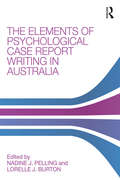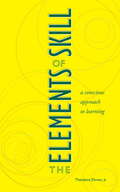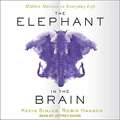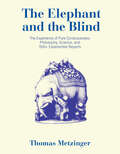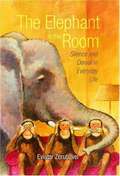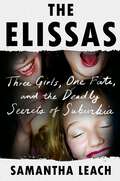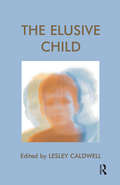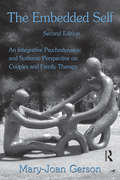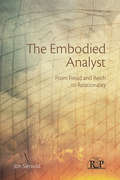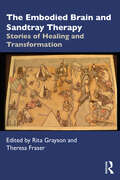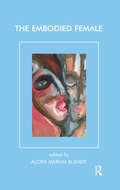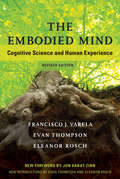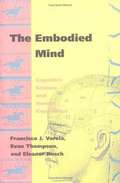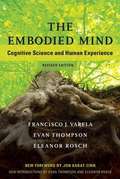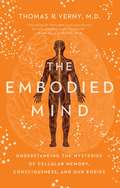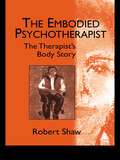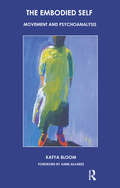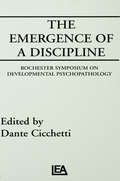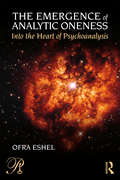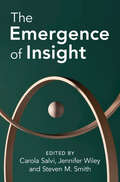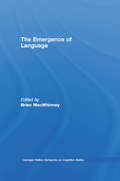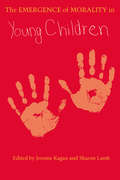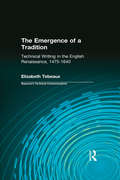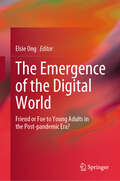- Table View
- List View
The Elements of Psychological Case Report Writing in Australia
by Lorelle J. Burton Nadine J. PellingThe Elements of Psychological Case Report Writing in Australia is a comprehensive and applied review of material required for basic case conceptualisation and report writing in Australia. This book is the first of its kind to offer a one-step resource to success in submitting concise case reports that demonstrate basic applied psychological competence. For anyone looking to submit case reports to the Psychology Board of Australia to support their application for general registration this is an absolute must-have resource. <P><P>Most notably this book provides: <P><P>Numerous assessment focused and intervention focused case report examples: <P><P>A presentation of case report requirements for 4+2 and 5+1 internship programs; <P><P>A review of important case conceptualisation areas necessary for applied psychological understanding; <P><P>Time management tips and guidance for making focused progress on the production of required case report and avoiding procrastination. <P><P>Both early career and experienced psychologists will find the case reports illustrative of various assessments and interventions in applied psychology in Australia. No other resource has collected together in one place multiple case reports illustrating the use of so many assessment instruments nor such a variety of interventions for the treatment of psychological difficulties in Australia.
The Elements of Skill
by Larry A. Hickman Theodore DimonWhy do so many beginners, both children and adults, fail to master chosen skills? The Elements of Skill was inspired by--and addresses--that question with a program based on proven techniques. The book, written by a renowned practitioner of the Alexander Technique, outlines an educational system that makes the process of learning a performance or athletic skill more conscious, and therefore more successful. Its principles include breaking down a skill into manageable parts, setting realistic goals, observing mind/body processes, overcoming blocks, controlling habits, and achieving heightened awareness and self-mastery. Included are inspiring examples of people who have benefited from the method.
The Elephant In The Brain: Hidden Motives In Everyday Life
by Kevin Simler Robin HansonHuman beings are primates, and primates are political animals. Our brains, therefore, are designed not just to hunt and gather but also to help us get ahead socially, often via deception and self-deception. But while we may be self-interested schemers, we benefit by pretending otherwise. The less we know about our own ugly motives, the better - and thus, we don't like to talk, or even think, about the extent of our selfishness. This is "the elephant in the brain". <p><p> Such an introspective taboo makes it hard for us to think clearly about our nature and the explanations for our behavior. The aim of this book, then, is to confront our hidden motives directly - to track down the darker, unexamined corners of our psyches and blast them with floodlights. Then, once everything is clearly visible, we can work to better understand ourselves: Why do we laugh? Why are artists sexy? Why do we brag about travel? Why do we prefer to speak rather than listen? <p> Our unconscious motives drive more than just our private behavior; they also infect our venerated social institutions such as art, school, charity, medicine, politics, and religion. In fact, these institutions are in many ways designed to accommodate our hidden motives, to serve covert agendas alongside their "official" ones. The existence of big hidden motives can upend the usual political debates, leading one to question the legitimacy of these social institutions, and of standard policies designed to favor or discourage them.
The Elephant and the Blind: The Experience of Pure Consciousness: Philosophy, Science, and 500+ Experiential Reports
by Thomas MetzingerAn engaging and insightful journey into human consciousness.What if our goal had not been to land on Mars, but in pure consciousness? The experience of pure consciousness—what does it look like? What is the essence of human consciousness? In The Elephant and the Blind, influential philosopher Thomas Metzinger, one of the world's leading researchers on consciousness, brings together more than 500 experiential reports to offer the world's first comprehensive account of states of pure consciousness. Drawing on a large psychometric study of meditators in 57 countries, Metzinger focuses on &“pure awareness&” in meditation—the simplest form of experience there is—to illuminate the most fundamental aspects of how consciousness, the brain, and illusions of self all interact.Starting with an exploration of existential ease and ending on Bewusstseinskultur, a culture of consciousness, Metzinger explores the increasingly non-egoic experiences of silence, wakefulness, and clarity, of bodiless body-experience, ego-dissolution, and nondual awareness. From there, he assembles a big picture—the elephant in the parable, from which the book&’s title comes—of what it would take to arrive at a minimal model explanation for conscious experience and create a genuine culture of consciousness. Freeing pure awareness from new-age gurus and old religions, The Elephant and the Blind combines personal reports of pure consciousness with incisive analysis to address the whole consciousness community, from neuroscientists to artists, and its accessibility echoes the author&’s career-long commitment to widening access to philosophy itself.
The Elephant in the Room: Silence and Denial in Everyday Life
by Eviatar ZerubavelThe fable of the Emperor's New Clothes is a classic example of a conspiracy of silence, a situation where everyone refuses to acknowledge an obvious truth. But the denial of social realities--whether incest, alcoholism, corruption, or even genocide-is no fairy tale. In The Elephant in the Room, Eviatar Zerubavel sheds new light on the social and political underpinnings of silence and denial--the keeping of "open secrets." The author shows that conspiracies of silence exist at every level of society, ranging from small groups to large corporations, from personal friendships to politics. Zerubavel shows how such conspiracies evolve, illuminating the social pressures that cause people to deny what is right before their eyes. We see how each conspirator's denial is symbiotically complemented by the others', and we learn that silence is usually more intense when there are more people conspiring--and especially when there are significant power differences among them. He concludes by showing that the longer we ignore "elephants," the larger they loom in our minds, as each avoidance triggers an even greater spiral of denial. Drawing on examples from newspapers and comedy shows to novels, children's stories, and film, the book travels back and forth across different levels of social life, and from everyday moments to large-scale historical events. At its core, The Elephant in the Room helps us understand why we ignore truths that are known to all of us. "Eviatar Zerubavel gathers intriguing ideas for books the way ace foreign correspondents acquire great stories: by reflecting on the obvious, then probing as well as reporting."--The Philadelphia Inquirer
The Elissas: Three Girls, One Fate, and the Deadly Secrets of Suburbia
by Samantha LeachAmazon's Best Nonfiction Book of the Month for June 2023Nylon's "June 2023's Must-Read Book Releases"Pure Wow&’s &“11 Books We Can&’t Wait to Read in June&”The Skimm&’s &“17 of Our Favorite Books Coming Out This Summer&”Glamour&’s &“15 Best Nonfiction Books of 2023, So Far&”Bustle&’s &“Most Anticipated Books Of Spring & Summer 2023&”Harper&’s Bazaar&’s &“23 Best Summer Beach Reads of 2023&”Zibby Mag&’s &“Most Anticipated Spring and Summer Books&” A New York Post Best Books of the Week selectionThree suburban girls meet at a boarding school for troubled teens.Eight years later, they were dead.Bustle editor Samantha Leach and her childhood best friend, Elissa, met as infants in the suburbs of Providence, Rhode Island, where they attended nursery, elementary school, and temple together. As seventh graders, they would steal drinks from bar mitzvahs and have boys over in Samantha&’s basement—innocent, early acts of rebellion. But after one of their shared acts, Samantha was given a disciplinary warning by their private school while Elissa was dismissed altogether, and later sent away. Samantha did not know then, but Elissa had just become one of the fifty-thousand-plus kids per year who enter the Troubled Teen Industry: a network of unregulated programs meant to reform wealthy, wayward youth. Less than a year after graduation from Ponca Pines Academy, Elissa died at eighteen years old. In Samantha&’s grief, she fixated on Elissa&’s last years at the therapeutic boarding school, eager to understand why their paths diverged. As she spoke to mutual friends and scoured social media pages, Samantha learned of Alyssa and Alissa, Elissa&’s closest friends at the school who shared both her name and penchant for partying, where drugs and alcohol became their norm. The matching Save Our Souls tattoo all three girls also had further fueled Samantha&’s fixation, as she watched their lives play out online. Four years after Elissa&’s death, Alyssa died, then Alissa at twenty-six. In The Elissas, Samantha endeavors to understand why they ultimately met a shared, tragic fate that she was spared, in turn, offering a chilling account of the secret lives of young suburban women.
The Elusive Child (The Winnicott Studies Monograph Series)
by Lesley Caldwell'Fuelled by agitation and panic about paedophilia, child abuse, violence and neglect on the one side, and by children as violent murderers and killers on the other, there has been an explosion of concern regarding the place, care, treatment and life of Children, in Europe and beyond. This broad-ranging and provocative collection of papers, a volume in the Winnicott Studies Monograph Series, focuses on all factors pertaining to the child and childhood, including the role that psychoanalysis has to play. The book offers a unique and fascinating understanding of developmental issues from early infancy through latency and into adolescence from various psychoanalytic approaches. The papers, written by experts in the field examine closely all aspects of this fascinating subject from Freud to Winnnicott; from neo-natal care to adolescence. The contributors take into account issues such as fostering and adoption, vital scrutiny of the role of the family, and presentation of children in the media while all the time asking the salient question, "What is a child?"
The Elusive Orgasm: A Woman's Guide to Why She Can't and How She Can Orgasm
by Vivienne CassAre you one of the thirty percent of women who has difficulties with orgasm? Do you want to experience greater sexual satisfaction? In easy to read language, The Elusive Orgasm provides a full overview of women's sexual pleasure, covering sexual triggers, stages of arousal, the power of mind, and how women differ from men. Longtime clinical psychologist and sex therapist Dr. Vivienne Cass reveals all the causes of women's orgasm difficulties - and how to remedy them. In The Elusive Orgasm, you'll learn: What an orgasm is How the clitoris is much more than "a little button" The stages of a woman's arousal The five types of orgasm difficulties The twenty-five causes of those difficulties Self-awareness via quizzes and questionnaires Sexual and non-sexual changes to help you orgasm Step-by-step plans to help you and your partner An extraordinarily thorough, all-inclusive exploration of every possible reason why women have orgasm challenges, The Elusive Orgasm gives you the tools to discover the source of your own orgasm difficulties, along with straightforward remedies.
The Embedded Self: An Integrative Psychodynamic and Systemic Perspective on Couples and Family Therapy
by Mary-Joan GersonFirst published in 1996, The Embedded Self was lauded as "a brilliant and long overdue rapprochement between psychoanalysis and family therapy conceived by a practitioner trained and experienced in both modalities of treatment." Mary-Joan Gerson’s integrated presentation of psychodynamic and family systems theory invited therapists of either orientation to learn the tools and techniques of the other, to mutual benefit. Firmly grounded in detailed case presentations, her focus on family therapy examined its history, organizing concepts, and developmental approaches, and addressed practical questions of diagnosis, clinical interaction, and referrals. A dozen years later, the psychoanalytic community is more open to integrating perspectives, and the growth of analysts working with couples and families necessitates an update of the material presented in The Embedded Self. Similarly, the family therapy community has deepened its interest in individual dynamics within systemic patterning. From a new and revised perspective on the possibilities of integration, Gerson covers the latest research in neuroscience and the transmission of affect within intimate relationships, with a new chapter on attachment theory and emotionally focused therapy. Sections on narrative therapy and psychoanalytically-oriented family therapy are expanded as well. The Embedded Self was a sterling introduction to family systems theory and therapy, and enhanced the work of analysts and family and couples therapists alike. The second edition proves no different in its context but wider in its scope, further enhancing the work of the family therapist interested in individual dynamics, and preparing the psychodynamically-oriented therapist who seeks to extend her craft from the dyad to the triad, and beyond.
The Embodied Analyst: From Freud and Reich to relationality (Relational Perspectives Book Series)
by Jon Sletvold2015 Gradiva Award Winner The Embodied Analyst brings together the history of embodied analysis found in the work of Freud and Reich and contemporary relational analysis, particularly as influenced by infant research. By integrating the ‘old’ embodied and the ‘new’ relational traditions, the book contributes to a new clinical perspective focusing on form and process rather than content and structure – the ‘how’, rather than the ‘what’ and the ‘why’. This perspective is characterised by a focus on movement, emotional interaction and the therapists own bodily experience in the analytic encounter. Jon Sletvold presents a user-friendly approach to embodied experience, providing the history, theory, training and practice of embodied experience and expression as a way of expanding clinical attention. Starting with a Spinozan view of the embodied mind, Part One: History of Embodied Psychoanalysis presents an overview of the history of the field in the works of Freud and Reich as well as a look at the Norwegian Character Analytic tradition . Part Two: Conceptual Framework and Clinical Guidelines explains how clinical interaction can be navigated based on the embodied concepts of subjectivity, intersubjectivity and reflexivity. Part Three: Embodied Training and Supervision presents innovative approaches to training in emotional communication inspired by the performing arts. The book ends with a consideration of the embodied analyst in the 21st century consulting room. Capturing key aspects of a transitional movement in the development of psychoanalysis and psychotherapy, The Embodied Analyst is ideal for those working and training in psychoanalysis and psychotherapy.
The Embodied Brain and Sandtray Therapy: Stories of Healing and Transformation
by Rita Grayson Theresa FraserThe Embodied Brain and Sandtray Therapy invites readers to absorb the magic and mystery of sandtray therapy through a collection of stories. Woven throughout these pages is the neurobiological foundation for the healing and transformation that takes place during deep encounters with sand, water, and symbolic images. Such scientific grounding provides the basis for clinicians to understand how sandtray therapy supports their healing work. In addition to client stories, the authors have also bravely shared their personal experiences, both challenging and rewarding, of being sandtray therapists. Clinicians who are considering becoming sandtray therapists are given an inside peek into the learning journey and its many benefits. Those who are already practicing sandtray therapy will find this book both supportive and affirming.
The Embodied Female (Psychoanalysis and Women Series)
by Mariam AlizadeThe Embodied Female is the first volume of this series for the Committee on Women and Psychoanalysis of the International Psychoanalytical Association. This book brings together highly original and insightful contributions from an international group of renowned psychoanalaysts.
The Embodied Mind, revised edition: Cognitive Science and Human Experience (The\mit Press Ser.)
by Evan Thompson Francisco J. Varela Eleanor RoschA new edition of a classic work that originated the “embodied cognition” movement and was one of the first to link science and Buddhist practices.This classic book, first published in 1991, was one of the first to propose the “embodied cognition” approach in cognitive science. It pioneered the connections between phenomenology and science and between Buddhist practices and science—claims that have since become highly influential. Through this cross-fertilization of disparate fields of study, The Embodied Mind introduced a new form of cognitive science called “enaction,” in which both the environment and first person experience are aspects of embodiment. However, enactive embodiment is not the grasping of an independent, outside world by a brain, a mind, or a self; rather it is the bringing forth of an interdependent world in and through embodied action. Although enacted cognition lacks an absolute foundation, the book shows how that does not lead to either experiential or philosophical nihilism. Above all, the book's arguments were powered by the conviction that the sciences of mind must encompass lived human experience and the possibilities for transformation inherent in human experience. This revised edition includes substantive introductions by Evan Thompson and Eleanor Rosch that clarify central arguments of the work and discuss and evaluate subsequent research that has expanded on the themes of the book, including the renewed theoretical and practical interest in Buddhism and mindfulness. A preface by Jon Kabat-Zinn, the originator of the mindfulness-based stress reduction program, contextualizes the book and describes its influence on his life and work.
The Embodied Mind: Cognitive Science and Human Experience
by Evan Thompson Francisco J. Varela Eleanor RoschThe Embodied Mind provides a unique, sophisticated treatment of the spontaneous and reflective dimension of human experience. The authors argue that only by having a sense of common ground between mind in Science and mind in experience can our understanding of cognition be more complete. Toward that end, they develop a dialogue between cognitive science and Buddhist meditative psychology and situate it in relation to other traditions such as phenomenology and psychoanalysis.
The Embodied Mind: Cognitive Science and Human Experience
by Jon Kabat-Zinn Evan Thompson Francisco J. Varela Eleanor RoschThis classic book, first published in 1991, was one of the first to propose the "embodied cognition" approach in cognitive science. It pioneered the connections between phenomenology and science and between Buddhist practices and science -- claims that have since become highly influential. Through this cross-fertilization of disparate fields of study, The Embodied Mind introduced a new form of cognitive science called "enaction," in which both the environment and first person experience are aspects of embodiment. However, enactive embodiment is not the grasping of an independent, outside world by a brain, a mind, or a self; rather it is the bringing forth of an interdependent world in and through embodied action. Although enacted cognition lacks an absolute foundation, the book shows how that does not lead to either experiential or philosophical nihilism. Above all, the book's arguments were powered by the conviction that the sciences of mind must encompass lived human experience and the possibilities for transformation inherent in human experience. This revised edition includes substantive introductions by Evan Thompson and Eleanor Rosch that clarify central arguments of the work and discuss and evaluate subsequent research that has expanded on the themes of the book, including the renewed theoretical and practical interest in Buddhism and mindfulness. A preface by Jon Kabat-Zinn, the originator of the mindfulness-based stress reduction program, contextualizes the book and describes its influence on his life and work.
The Embodied Mind: Understanding the Mysteries of Cellular Memory, Consciousness, and Our Bodies
by Thomas R. VernyAs groundbreaking synthesis that promises to shift our understanding of the mind-brain connection and its relationship with our bodies.We understand the workings of the human body as a series of interdependent physiological relationships: muscle interacts with bone as the heart responds to hormones secreted by the brain, all the way down to the inner workings of every cell. To make an organism function, no one component can work alone. In light of this, why is it that the accepted understanding that the physical phenomenon of the mind is attributed only to the brain? In The Embodied Mind, internationally renowned psychiatrist Dr. Thomas R. Verny sets out to redefine our concept of the mind and consciousness. He brilliantly compiles new research that points to the mind&’s ties to every part of the body. The Embodied Mind collects disparate findings in physiology, genetics, and quantum physics in order to illustrate the mounting evidence that somatic cells, not just neural cells, store memory, inform genetic coding, and adapt to environmental changes—all behaviors that contribute to the mind and consciousness. Cellular memory, Verny shows, is not just an abstraction, but a well-documented scientific fact that will shift our understanding of memory. Verny describes single-celled organisms with no brains demonstrating memory, and points to the remarkable case of a French man who, despite having a brain just a fraction of the typical size, leads a normal life with a family and a job. The Embodied Mind shows how intelligence and consciousness—traits traditionally attributed to the brain alone—also permate our entire being. Bodily cells and tissues use the same molecular mechanisms for memory as our brain, making our mind more fluid and adaptable than we could have ever imaged.
The Embodied Psychotherapist: The Therapist's Body Story
by Robert ShawThe therapist's body is a vital part of the therapeutic encounter, yet there is an inherent inadequacy in current psychotherapeutic discourse to describe the bodily phenomena. Until recently, for instance, the whole area of touch in psychotherapy has been given very little attention. The Embodied Psychotherapist uses accounts of therapists' own experiences to address this inadequacy in discourse, and provides strategies for incorporating these feelings into therapeutic work with clients. Drawing on these personal accounts, it also discusses the experiences that can be communicated to the therapist during the encounter.This description and exploration of how practitioners use their bodily feelings within the therapeutic encounter book will be valuable for all psychotherapists and counsellors.
The Embodied Self: Movement and Psychoanalysis
by Katya BloomBy integrating principles from her background as a movement psychotherapist and movement analyst with key concepts from contemporary psychoanalysis, the author offers a new perspective on exploring the interrelationships between nonverbal and verbal 'articulation' in any therapy setting. The Embodied Self provides a practical and experiential working model for developing therapists' embodied attentiveness, which will enhance their recognition of the sensori-affective manifestations of transference and countertransference. It will inform the work of psychotherapists and psychoanalysts, dance movement therapists, and body psychotherapists, as well as those involved in psychoanalytic observational studies. It will also be of great value to anyone interested in exploring the interrelationships between the psyche and the body.
The Emergence of A Discipline: Rochester Symposium on Developmental Psychopathology, Volume 1 (Rochester Symposium on Developmental Psychopathology Series)
by Dante CicchettiCompiled from papers presented at the Rochester Symposium on Developmental Psychopathology, this is the first book of its kind devoted to disseminating theory and research in the field of psychopathology. Contributions to this text are unified by their incorporation of developmental principles into the study of various types of emotional disorders in children and adults. Also emphasized in this book is the importance of bridging the dichotomy between scientific research and the application of this knowledge to clinical populations. Designed as both a required and supplementary text for advanced undergraduate and graduate courses in developmental psychopathology, abnormal, clinical, and health psychology as well as neuroscience. Also insightful for psychiatric and pediatric residents, nurses, and social workers.
The Emergence of Analytic Oneness: Into the Heart of Psychoanalysis (Psychoanalysis in a New Key Book Series)
by Ofra EshelThe Emergence of Analytic Oneness is a profound and penetrating exploration of a fundamental dimension of analytic presence and patient–analyst interconnectedness that offers new possibilities for extending the reach of psychoanalytic treatment and working with some of the most difficult treatment situations. Eshel listens with a 'hearing heart' and gives herself over to being within the patient’s experiential world and the grip of the unfolding analytic process. She has gone with her patients into black holes, dissociation, deadness, sleepiness, petrifaction, silence, longings, the depths of perversion, and the enigmas of telepathic dreams, while experiencing the emergence of patient–analyst two-in-oneness, with its challenges and mysteries. Drawing on Winnicott’s posthumous writings and Bion’s late work and going beyond recent analytic notions of intersubjectivity and witnessing to interconnectedness and 'withnessing,' Eshel offers her own understanding of at-one-ment or "being-in-oneness" with the patient’s emotional reality as the only state of analytic being that can meet and transform core unthinkable breakdown and mental catastrophe. The critical question here is to what extent the analyst is willing and able to open the boundaries of his or her psyche to the patient, especially in difficult, unbearable and devastated-devastating states. Eshel’s clinical narratives are detailed, intense, theoretically grounded, and very moving. The Emergence of Analytic Oneness will be an invaluable guide for psychoanalysts, psychotherapists, and students in these fields who want to extend their reach into deeper levels of disturbance in the difficult clinical work they do.
The Emergence of Insight
by Steven M. Smith Carola Salvi Jennifer WileyWe are all familiar with the feeling of being stuck when a problem we are faced with seems intractable and we are unable to find a solution. But sometimes, a new way of seeing the problem pops into the mind from out of the blue. The missing piece of the puzzle is found, the gap is filled, and the solution is now obvious. This is the insight experience - the Aha! Moment - which has been a source of fascination to those who study problem solving for centuries. Written by leading researchers from around the world, this volume explores cutting-edge perspectives on insight, the processes that underlie it, and the conditions that promote it. Chapters draw on key themes: from attention, to memory and learning, to evolutionary perspectives. Students and researchers in applied, cognitive, and educational psychology, as well as those studying creativity, insight, and cognitive neuroscience, will benefit from these perspectives.
The Emergence of Language (Carnegie Mellon Symposia on Cognition Series #88)
by Brian MacWhinneyFor nearly four centuries, our understanding of human development has been controlled by the debate between nativism and empiricism. Nowhere has the contrast between these apparent alternatives been sharper than in the study of language acquisition. However, as more is learned about the details of language learning, it is found that neither nativism nor empiricism provides guidance about the ways in which complexity arises from the interaction of simpler developmental forces. For example, the child's first guesses about word meanings arise from the interplay between parental guidance, the child's perceptual preferences, and neuronal support for information storage and retrieval. As soon as the shape of the child's lexicon emerges from these more basic forces, an exploration of "emergentism" as a new alternative to nativism and empiricism is ready to begin. This book presents a series of emergentist accounts of language acquisition. Each case shows how a few simple, basic processes give rise to new levels of language complexity. The aspects of language examined here include auditory representations, phonological and articulatory processes, lexical semantics, ambiguity processing, grammaticality judgment, and sentence comprehension. The approaches that are invoked to account formally for emergent patterns include neural network theory, dynamic systems, linguistic functionalism, construction grammar, optimality theory, and statistically-driven learning. The excitement of this work lies both in the discovery of new emergent patterns and in the integration of theoretical frameworks that can formalize the theory of emergentism.
The Emergence of Morality in Young Children
by Jerome Kagan Sharon Lamb"The Emergence of Morality in Young Children is one of very few scholarly books concerning the development of moral tendencies in the early years. In its pages, a diverse group of eminent social and behavioral scientists address this fascinating topic and struggle with issues of inquiry that have persistently plagued this field."—Nancy Eisenberg, Harvard Educational Review <P><P> "This is a welcome and immensely provocative book. For those of us who favor ethical theorizing done in close proximity to psychology and anthropology, it provides new and illuminating theory and research relevant to perennial debates about the origins of moral sense, its psychological organization, and the objectivity and unity of the moral."—Owen Flanagan, Ethics <P><P> The contributors are Augusto Blasi, Lawrence Blum, Judy Dunn, M. Ann Easterbrooks, Carolyn Pope Edwards, Robert Emde, Carol Gilligan, Charles C. Helwig, William F. Johnson, Jerome Kagan, Melanie Killen, Sharon Lamb, Manamohan Mahapatra, Joan G. Miller, Edward Mueller, Richard A. Shweder, Catherine Snow, Elliot Turiel, and Grant Wiggins.
The Emergence of a Tradition: Technical Writing in the English Renaissance, 1475-1640 (Baywood's Technical Communications)
by Elizabeth TebeauxExamining books on different topics as these appeared during the Renaissance allows us to see developments in the use of graphics, the shift from orality to textuality, the expansion of knowledge, and rise of literacy, particularly among middle-class women readers, who were an important audience for many of these books. Changes in English Renaissance technical books provide a new, and as yet largely unexplored means of viewing the Renaissance and the dramatic changes that emerged during the 1475-1640 period, the first years of English printing.
The Emergence of the Digital World: Friend or Foe to Young Adults in the Post-pandemic Era?
by Elsie OngThis book specifically focuses on young adults who have the highest usage of digital technologies in their daily lives. We have assembled contributions of knowledge from scholars and students in Higher Education as they have the most direct experience of going through COVID and were most impacted by it. Through the collection of these views and studies, we will critically discuss how digital technological advances the unique experiences of young adults going through the pandemic. The content will cover a wide range of learning, policy-making, and mental health outcomes to raise pragmatic value to those appraising, and restructuring programs for individuals engaging in digital technologies. This book will draw conclusions on important clinical impact and scientific value on what might be the new direction for upcoming digital intervention and the trend of newly designed educational program for Higher Education. Readers will gain knowledge on the significant impact upon research and improvements for this young generation.
